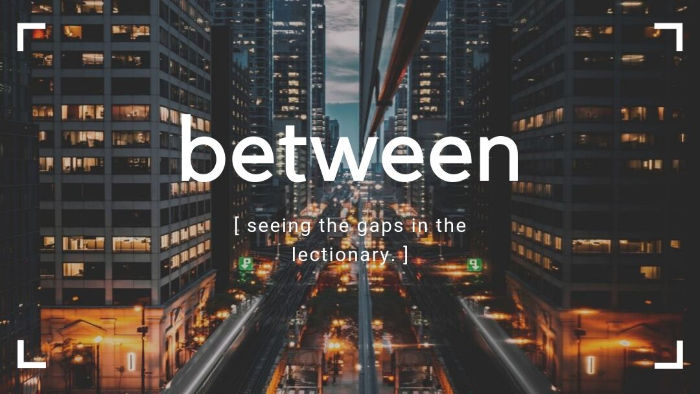A look at the gaps in the lectionary.
This week: the gap between Proper 27C and Proper 28C.
The text: Luke 20:39-21:4.
This week, the text between the text has a bit more spitfire from Jesus. Of course, we should come to expect this.
There’s also a craftiness and creativity from Jesus in these days before the Passion. Noticing that character trait will make sense of those later parts which often confuse us. Especially when we get to the matter of the swords.
But that’s not here yet. What we have is something situationally novel.
If you’ve been reading along, you no doubt know that we’re smack in the middle of the confrontations at the Temple during Jesus’s last week. These aren’t teachings in the middle of nowhere. They’re deeply connected to the situation of the Passion and what Jesus came to Jerusalem to do.
So we had three confrontations: one each by Pharisees, Scribes, and Sadducees. If you’re like me, you added verses 39 and 40 to the gospel on Sunday to get a more complete picture. But if not, here they are at the top of our story.
“Then some of the scribes answered, ‘Teacher, you have spoken well.’ For they no longer dared to ask him another question.”
Luke 20:39-40
Clearly Jesus humiliated them into silence. Which is just so satisfying!
More importantly it reveals this isn’t a matter of the whole leadership against Jesus. It isn’t a complete Us vs. Them moment. In other words, there are some Good Samaritans among the bunch willing to actually call a spade a spade.
And that sensation alone feels like its worth the price of admission, right? That’s what we long for!
How many times have we said to one another: won’t someone go against their party and vote their conscience? And when some do, we applaud them like heroes.
Now it’s Jesus’s turn
Jesus gives it back with a trick question of his own. One none of them can safely answer. And in Luke’s telling, they don’t even try.
Jesus spoke. It doesn’t say anything about how it was taken.
Honestly, I’m not interested in untangling the nature of Lord, son, David, Messiah, and God’s right hand. In part because I think it isn’t really worth our time.
What I’m more interested in is who he’s speaking to. It says:
”Then he said to them,”
Who is the them here?
Well, given what happens next, it would seem the scribes. Those same ones who just said he spoke rightly. Now he’s confronting them with a seeming gotcha question of his own!
Why is Jesus dunking on the scribes?
Jesus Denounces the Scribes
Then Jesus turns around, and in a stage whisper for the whole crowd to hear, tells the disciples that the scribes are lying liars.
Too many of us are nice and think this seems like a jerk thing to do. We want to give these scribes the benefit of the doubt, right? Aren’t they Good Samaritans now? Shouldn’t we walk a mile in their shoes? I’m thinking we have about five thousand feet to go.
That isn’t Jesus’s point, though. Not in that earlier parable or in this teaching.
These Scribes are still stealing from the people, lying to the people, and threatening the livelihood of the people. And just because a few were like, hey, maybe we shouldn’t stone this heretic today doesn’t mean everything’s just fine.
They haven’t begged for mercy or sought reconciliation. In fact, they did something else.
They judged him; gave him a grade. You pass.
And what Jesus tells the disciples is that the scribes stand around judging people and mugging for the camera.
Jesus doesn’t accept their compliment because it wasn’t really one.
The Convenient Parable
In that moment, Jesus sees a convenient opportunity to turn life into a kind of a parable. Not as a made up story, but one happening before their eyes.
He points to the people contributing to the temple. And he’s like: Here’s the deal with the powerful. They love being seen. And they give big sums of money for things they can put their name on. While at the same time, there’s a widow with two coins to her name. Watch what she does.
She puts the coins in the slot.
How much wealth does she have now?
Nothing.
This is the matter of our faith. The physical enfleshment of our faith. Rich people writing checks with no sacrifice to their standard of living. And poor giving literally everything, knowing they’ll die in a matter of days on the street. We live in a Kingdom of Humanity that tolerates that and calls it reality.
This Week
I’m starting to love this transition between the teaching so terribly interpreted as “the widow’s mite” to this week’s prediction of the destruction of the temple. It is far more natural to me than it used to be.
I used to focus on the social justice in the teaching in the former and then the apocalyptic in the latter. But the two now feel really connected.
This is the corruption of the culture; the weakness of our status quo. It is the way we’re ignoring the truth and the conditions which overwhelm our humanity.
We’re letting people die and claim its inevitable. And yet, at the same time, we’re tolerating extreme wealth and claiming that is inevitable too. So we’re ignoring the fact that people did that on purpose.
As Anand Giridharadas says, we engineered it that way.
The world is engineered. And the hopeful thing about that is, it is actually not that complicated to engineer differently.
– Anand Giridharadas
How could this several weeks of Jesus tearing down the temple leadership not end in the foretelling of the Temple’s destruction? After all, it is the literal manifestation of what Jesus is doing now.
